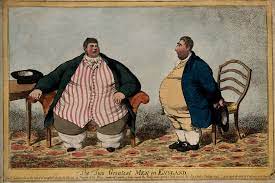1 June 2023
Fat
is more than a feminist issue.
By Lynda Goetz

The other day I was sent a two-frame cartoon which made me laugh. The issue it raised, like many things which make us laugh, is serious. The first frame showed a male figure, clearly intended to be a father, (I do hope that I’m still allowed to make these assumptions) bending down to talk to a youngster. “What are the words we use to get what we want?” he says. In the next frame a rather aggressive-looking child responds, “I’m offended.”
This says an awful lot about the modern Anglophone world. These days, the word ‘respect’ is bandied about a great deal, but neither respect nor good manners appear to be very common. In a seemingly desperate attempt not to upset any minority, however small, the pendulum seems to have swung right across to a point where, in order not to offend anyone at all, we either dare not say anything; we put forward arguments which fly in the face of reason or we contradict ourselves in the most ridiculous ways.
Take the issue of obesity; a growing problem in this country in which the latest statistics issued this month show that two out of three people are now overweight and nearly one in three are obese. To be overweight you will have a body mass index (BMI) of over 25. Being obese means you will have a BMI over 30 and of the 28 percent who fall into this category, more than 10 percent have a BMI over 35. Carrying extra weight brings with it all sorts of additional health issues, many of which are serious, as the Covid pandemic highlighted. Although the likelihood of dying from Covid if you were overweight was one unexpected outcome, being overweight carries with it the risk of many other chronic health problems, including Type 2 diabetes, cardiovascular diseases, respiratory diseases, musculoskeletal disorders and several types of cancer, as well as an increased propensity to depression. In 1990 only 14 percent of the population fell into the obese category. What has happened in the intervening 33 years?
Clearly there are number of contributing factors, including a changing diet with much more processed food and sugary drinks, attitudes to mealtimes and snacking and lack of exercise. However, perhaps an additional issue is that the stigma of being fat has been removed. Those who are fat must not be offended. It is no longer acceptable to be ‘fatist’ or to ‘fat shame’. The ‘body positivity’ movement, whilst providing mental health help in many ways, has also contributed to the paradox which is the modern approach to our bodies. On the one hand we are urged to accept ourselves for what we are and, in many ways quite rightly, not to cause ourselves mental anguish over what we are not. At the same time social media and peer pressure causes us to compare ourselves to models, film stars, celebrities and influencers whose own bodies, even before enhancement and gym sessions, were far closer to perfection than most of us could ever dream to attain.
Susie Orbach’s book ‘Fat is a Feminist Issue’, written over forty years ago, was for many a seminal work, drawing attention to the way that being female contributed to the difficulties of excess weight. Clearly opinions were and still are divided over what some considered the unscientific and psychological focus of the book, but it is still being read 40 years on, even if it is now generally considered to be dated. Unfortunately, whichever way one looks at it, the problem is no longer simply a feminist issue, if indeed it ever was.
Reports a couple of weeks ago highlighted, once again, that the cost to the NHS of obesity runs into billions. On average the health service apparently spends twice as much per annum on the heaviest patients (£1,375) as those of normal weight (£638). Whilst the production of these figures may be the result of a ‘first of its kind’ study, the fact that the cost to the NHS of obesity is enormous will not come as news to anyone working within the institution. According to an article published on the gov.org website in 2017, 63% of adults in England were classed as overweight in 2015 (this has now risen to 68%) and although the prevalence of obesity is similar among men and women, men were more likely to be overweight. It is estimated that the NHS spent £6.1 billion on overweight and obesity-related ill-health in 2014 to 2015. Annual spend on the treatment of obesity and diabetes is greater than the amount spent on the police, the fire service and the judicial system combined. These are shocking statistics which are getting worse. The latest figures suggest that the NHS could save around £14 billion if everyone were a healthy weight. The cost to the country is, of course, even greater, as many of these people cannot work owing to their chronic problems. This means that not only are they not paying taxes to the Treasury, but instead drawing benefits, they are generally not contributing to the economy.
In December last year, consultant surgeon, J.Meirion Thomas wrote an article for The Telegraph which started with the words, “Let’s stop the political correctness and the pretence. In the vast majority of cases, obesity is due to a lifestyle choice and thus avoidable”. He goes on to say that “Too few are prepared to emphasise personal responsibility, to stress the dangers of obesity, or to encourage weight reduction before multi-organ damage becomes irreversible”. This man knows what he is talking about. As a surgeon he will be only too well aware of the damage caused and the multiple effects it has on those who are obese (he will undoubtedly have had to cut through layers of fat to operate on some of them or have colleagues who have had to amputate limbs as a result of the advanced effects of diabetes). However, as he adds, “…obesity is usually self-inflicted and it harms other people. Its additional costs are shared among all taxpayers. It is essentially no different to tobacco smoking, recreational drug use and drink driving or speeding”.
Mr Thomas’s view may not be popular as it will almost certainly offend, and we are living through a time when this is not permissible. ‘Victimhood’ is currently the name of the game. However his words were spoken, as he said, “….in the hope that a proportion of obese people will heed the warnings and lose weight. Possibly, a few lives might be saved.” Since he wrote this, the ‘gamechanging’ drug semaglutide, (sold as Wegovy or Ozempic), has been recommended for use on the NHS for those with a serious obesity problem, although, like all drugs, it does not come without its own problems or side-effects. However, on the NHS it is only available to a limited number of obese patients; for the majority, unless they are able to afford this privately, it will not be available. (There is also the question of what will happen to patients after the two-year period during which the drug may be prescribed comes to an end). So what about the remainder?
Boris Johnson’s obesity strategy seems to be rather on hold, much to the dismay of those who have long campaigned for several of the measures included in it. The ‘sugar tax’ introduced in 2018 may have put up the price of sugary drinks (although not fruit juice which contains more sugar than many people think), but has it really done much to stop the consumption of such drinks? The increase in childhood obesity as well as adult obesity would suggest not. What about the 9pm watershed ban for advertising ‘junk’ food? Well, it was announced at the end of last year that it was being pushed back to October 1st 2025, although no reasons were given. Keir Starmer has now indicated that he may look at legislation on the issue if he comes to power after the next election, but is more legislation what is really needed?
In a week when a teacher has been banned from the profession until at least 2025 for ‘misgendering’ a child, would it be offensive to suggest that perhaps some lessons on food, cookery and its links to obesity be taught instead of the liberal beliefs that women ‘can have a penis’ and that there are up to a hundred different genders? Might this, combined with more sport in schools, and possibly some parental denial of children’s demands, help to reverse the last thirty years of our increasing obesity epidemic? Unfortunately, given the high costs both financial and personal, fat really is now an issue which affects us all.


